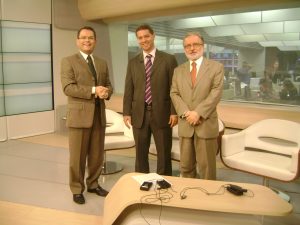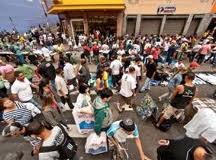O Globo - Column Miriam Leitão - 28/06/2011
An Argentina or two Chiles. This is the size of the underground economy in Brazil, according to the Brazilian Institute of Competition Ethics (Etco) and the Getúlio Vargas Foundation. Because it is not formal, it is difficult to measure, but one can imagine the harm it does to the country. According to a study to be released today, last year it was R $ 663,4 billion or 18,3% of GDP.
The new president of Etco, ambassador Roberto Abdenur, explains that to reach the number, economists have to use approximation methods. One of the ways, says economist Fernando Holanda Barbosa Filho, is the calculation by the labor market. Even informal workers are included in IBGE surveys, such as Pnad, which covers all of Brazil, and the Monthly Employment Survey (PME), which is calculated in six metropolitan regions.
- The informal economy leaves traces such as those in the labor market and in the demand for currency, and we can calculate it by informal work or by the monetary method - says Barbosa Filho.
For these traces they calculate. It is always an imprecise measure, by its very nature, but it has become more sophisticated. In the future, we will try to include capital income and studies by economic sector and regions of the country.
The good news is that the economy they define as underground, which includes “goods and services not deliberately reported to the government,” has not grown. It was stable last year compared to the previous year as a proportion of GDP; in the series starting in 2003, the size of this shadow economy has dropped from 21% to 18,3%. The bad news is that even in a year of strong GDP growth, 2010, and in a period of greater formalization of employment, the size of this economy has not fallen, but has stabilized at around 18% of GDP.
One of the reasons, according to Fernando Holanda Barbosa Filho, is that although the PME shows a drop in informal employment, the national figure has not shown such a sharp drop.
Economist Luiz Schymura explains that the study is a tool for the organization of society:
- We entered into this endeavor with Etco because we think that this subject is little discussed. When the politician uses cash two to cover campaign expenses, society compromises; when he puts it in his pocket, there is a greater condemnation. Combating this Brazilian way is a fundamental discussion in Brazil today.
Abdenur explains that Etco does not lobby; it just wants to study, inform, give companies or the public sector tools to create a better business environment in the fight against piracy, evasion, and unfair competition.
Even higher figures have been released for the Brazilian informal economy, but Etco and FGV think that calculating, as they have done, is better than imagining a number.
- The underground economy is a symptom. It is not enough just to fight. It is necessary to make an effort to institutionalize the country - said Marcílio Marques Moreira, also from the institute.
An example happened in Bahia. Etco has partnered with the state finance department and Microsoft, which has developed a program that manages to cross-check information to avoid false fate; that is, the company declares that it is selling to another state to pay less ICMS.
- In this way, research work linked to electronic invoices is carried out. The ICMS is now the largest source of tax evasion through the simulation of the destination. The program takes this type of tax evasion, but the commitment to Microsoft was that it be shared with other states. And it really is, now it is Espírito Santo to implement the system - says Hoche José Pulcherio, president of the Board of Directors of Etco.
As an underground economy, they define the production of goods and services that evades taxes, does not pay social security contributions, evades compliance with labor laws and regulations and avoids the costs of complying with rules.
But as it is partly a symptom, what they want is to fight it through different ways. One is to simplify the payment of taxes in Brazil. The excess of norms is an incentive to enter informality or for a formal company to end up having part of its activities in informality.
This is exactly the confusion. There is no clear border between formal and informal, between legal and illegal in Brazil. There is an under-declaration of income. The formal sector provides for the informal, and benefits in part from the lower prices of informal suppliers. At the same time it is hampered by the competitor who does not pay taxes.
To undo this web that was forming in the economy, due to the complacency or the complexity of the country's rules, Etco wants to use FGV's studies on the topic to show how much the country loses. And to build coalitions between companies and the government that put pressure on the economy for ever greater formalization. This is what they did with the Ministry of Justice in the fight against piracy and with the IRS and Cade to combat unfair competition in the beer market.






